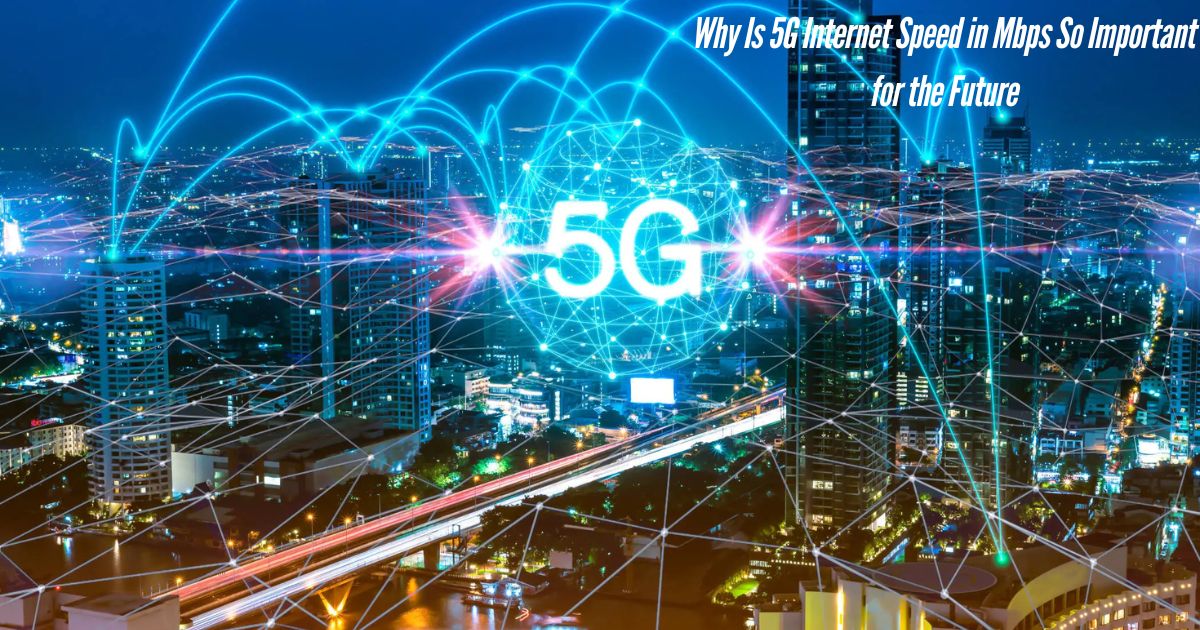The Dawn of a Digital Revolution
Imagine a world where downloading a full-length HD movie takes mere seconds, where doctors perform surgeries remotely, and where cities operate seamlessly with smart technologies. Does it sound futuristic? Not anymore. These advancements are possible because of 5G—the fifth-generation mobile network. But why is 5G Internet speed in Mbps so important for the future?
This article delves into the transformative potential of 5G, breaking down how its speed in Mbps will shape industries, improve daily lives, and redefine connectivity. Stick around as we uncover the valuable insights and actionable steps you need to stay ahead in this 5G-powered world.
What Is 5G Internet Speed in Mbps?
5G stands for the fifth generation of wireless technology. Unlike its predecessors, 5G promises speeds ranging from 1 to 10 Gbps in ideal conditions. In Mbps (megabits per second), this equates to 1,000 to 10,000 Mbps, a monumental leap compared to 4G’s average speed of 20-30 Mbps.
Key Features of 5G:
- Blazing Fast Speeds: speeds up to 100 times faster than 4G.
- Low Latency: Response times of 1 millisecond (ms) compared to 50 ms on 4G.
- Massive Connectivity: Supports 1 million devices per square kilometer.
- Reliability: Stable connections even in high-density areas.
The Importance of 5G Internet Speed in Mbps for Industries
1. Healthcare Revolution
5G enables telemedicine, remote surgeries, and real-time patient monitoring. For instance, a surgeon in New York can operate on a patient in Tokyo with minimal lag.
Case Study: In 2020, China conducted its first remote brain surgery over a 5G network. The 2,000-mile distance between the surgeon and patient had no noticeable delay, demonstrating 5G’s potential.
2. Smart Cities and IoT
5G’s high Mbps speeds allow cities to integrate technologies like traffic management, waste control, and energy optimization. Imagine real-time traffic updates ensuring zero congestion.
3. Entertainment Industry
Streaming in 4K and 8K becomes seamless, and augmented reality (AR) and virtual reality (VR) experiences will reach new heights. Gamers can expect lag-free sessions, even in massive multiplayer environments.
Data Point: According to Ericsson’s Mobility Report, 5G subscriptions will reach 4.6 billion by 2028, making such experiences mainstream.
Why Is 5G Internet Speed in Mbps So Important for Daily Life?
1. Enhanced Connectivity
With speeds exceeding 1,000 Mbps, activities like video calls, online learning, and remote work become smoother and more reliable.
2. Empowering Rural Areas
5G can bridge the digital divide, providing high-speed internet to remote areas and enabling equal access to education and healthcare.
3. Real-Time Interactions
The ultra-low latency of 5G enhances applications like video conferencing, online gaming, and live streaming. Imagine a virtual meeting with no awkward lags.
Advantages of 5G Internet Speed in Mbps
| Advantage | Explanation |
|---|---|
| Ultra-Fast Speeds | Downloads and uploads happen in seconds. |
| Low Latency | Ideal for applications requiring instant feedback, like AR/VR and gaming. |
| Massive Connectivity | Supports IoT devices for smart homes, cities, and industries. |
| Energy Efficiency | Devices connected to 5G consume less power for data transfer. |
| Enhanced Reliability | Offers stable connections even in crowded areas. |
Actionable Tips to Leverage 5G
- Upgrade Your Devices: Ensure your smartphone or router is 5G-compatible.
- Choose the Right Plan: Opt for a 5G data plan that matches your needs.
- Stay Updated: Monitor 5G rollout in your region to access its benefits early.
- Explore Applications: Experiment with 5G-powered apps like AR games or telemedicine platforms.
The Challenges of 5G Adoption
While the advantages are compelling, there are hurdles:
- Infrastructure Costs: Setting up 5G towers and networks is expensive.
- Device Compatibilitcompatibilityceolder not 5G-ready, requiring upgrades.
- Energy Consumption: Despite efficiency, 5G networks consume more energy initially.
FAQs
1. What is the difference between 5G and 4G in Mbps?
5G offers speeds of 1,000-10,000 Mbps, whereas 4G averages around 20-30 Mbps.
2. How does 5G improve gaming experiences?
Its low latency and high Mbps speeds eliminate lags, providing a seamless experience for online gamers.
3. Is 5G available worldwide?
Not yet. Rollouts are ongoing, with urban areas prioritized over rural regions.
4. Can 5G replace home broadband?
Yes, in many cases, 5G’s speed and reliability rival or surpass traditional broadband.
5. Why is 5G crucial for autonomous vehicles?
5G’s low latency allows real-time communication between vehicles, ensuring safety and efficiency.
Final Thoughts: Embrace the 5G Future
The question “Why Is 5G Internet Speed in Mbps So Important for the Future?” has a resounding answer: it’s the key to unlocking unprecedented possibilities. From revolutionizing industries to enhancing everyday life, 5G is not just faster—it’s transformative.
As we stand on the brink of this technological leap, it’s time to prepare. Upgrade your devices, explore new applications, and embrace the future with open arms. Share this article with friends and join the conversation about the 5G revolution. The future is here—are you ready to experience it?
